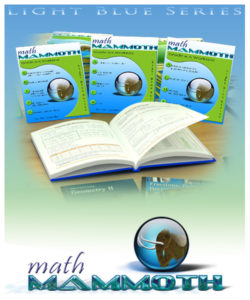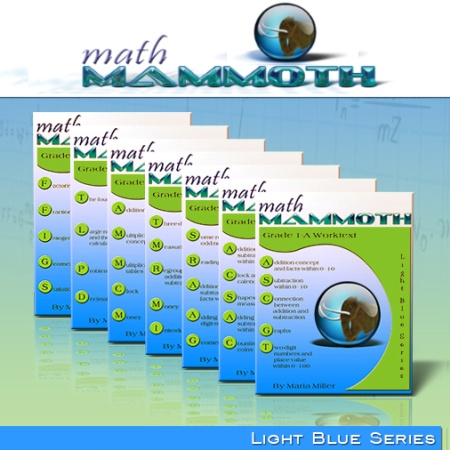Interview with Maria Miller of Math Mammoth
 I am so excited to have the opportunity to welcome our interview guest, Maria Miller of Math Mammoth. Maria has a master’s degree in mathematics, and over twenty years of experience creating math resources for homeschoolers.
I am so excited to have the opportunity to welcome our interview guest, Maria Miller of Math Mammoth. Maria has a master’s degree in mathematics, and over twenty years of experience creating math resources for homeschoolers.
We are honoured to have the privilege of interviewing her today.
Maria’s Passion for Math
Courtenay: Can you give us a bit of background on your passion for math and math curricula?

Maria: It started in high school. Before that time, math wasn’t anything special to me. But in my first year of high school (10th grade), I had a really good and inspiring math teacher who was often commenting that soon, there would be a lack of math teachers in Finland. During that year, I changed my mind as to my future occupation. Before that, I had thought I’d want to be an elementary school teacher, but that year I decided I would become a math teacher. The next two years I had a different teacher – not really inspiring – but I kept to my choice, and after high school, immediately applied to the math teacher program at my local university (University of Joensuu).
As far as being passionate about math curricula, that came about a bit later. In the early 2000s, after moving continents, I found myself tutoring several homeschooled (American) children. I saw several popular homeschool math curricula, and I felt ALL of those curricula were lacking greatly when it came to conceptual understanding. That was what provided me the impetus to start writing some materials myself.
However, I didn’t start out writing an actual curriculum. My first “books” were by topics, and in a now-obsolete “.exe” ebook format. A few years later I switched to PDF format. Then people started requesting me to write an actual grade-level curriculum, and in the mid-2000s I started working on that. It’s been a long journey, lots of work, lots of books and materials… but it started out pretty humble and small. 🙂
Enjoying Math
Courtenay: Was math something you personally enjoyed as a child?
Maria: I found it easy and in that sense I enjoyed it. It wasn’t anything special though among the school subjects… until high school, and especially, university. It was only in my university studies that I encountered mathematical proofs and how fields of mathematics start from axioms, from which are built theorems, step by step… a logical structure that is built from ground up. All of this fascinated me a lot—and thus, I really started enjoying mathematics.
This knowledge of (somewhat) higher math has helped me in my curriculum writing, because I can see how different math concepts lead to others, down the road. Many others don’t have that advantage, or that knowledge, and thus they tend to write materials that focus on the “how” of math. I think it boils down to how these authors see and experience math themselves: it’s a bunch of rules of “HOW” to calculate things. But once you’ve seen what math really is—an intricate structure of “building blocks (that we call theorems) that build upon each other in a perfect manner—you want to convey at least a little bit of that to children. And that is why I have such a strong focus on conceptual understanding in my books.
Encouraging Children in Math
 Courtenay: What advice would you give to a homeschooling parent whose student does not enjoy math? What advice would you give to a parent whose student DOES enjoy it?
Courtenay: What advice would you give to a homeschooling parent whose student does not enjoy math? What advice would you give to a parent whose student DOES enjoy it?
Maria: The two main ones are: (1) Either now, or somewhere along the way in the past, math has been difficult for your child. Struggling and not understanding is the main reason math becomes not enjoyable. To fix that, find out if there are any gaps, any concepts the child has not grasped from the past, because those could be hindering their progress now. Another way this can happen is if the child is placed too high into a specific math curriculum.
(2) Another big reason is the attitudes other people have shown towards math. If parents, siblings, friends, etc. show enthusiasm and enjoyment towards mathematical processes, such as when math is used in daily life, the child will absorb those attitudes. The converse is also true. If, say, mom makes statement about not being able to do math, or not liking it, the child will “assimilate” that attitude. One of the main attributes of a good teacher is that they love the subject they’re teaching. As homeschooling parents, we need to be excited/happy about what we teach, and at the very least, not be negative towards any school subject—or our child will have that same attitude.
If your child already enjoys math, then you’re doing well! So, keep doing what you are doing! Also, I recommend using challenging and open-ended problems occasionally. See a list of such at https://l.mathmammoth.com/challengingproblems
The Goal of Math
Courtenay: What do you see as the main goal of a grade school math curriculum?
Maria: In my opinion, the goals of school mathematics are these. Children need to…
(1) Understand enough mathematics so they can function in daily life. This would involve, in particular, percentages, fractions, decimals, estimation, and a good amount of number sense.
(2) Learn enough about statistical concepts and percentages so they can understand and judge information they read or hear in the media. Advertisements often “lie” with statistics. Percentages are crucial to understand so you don’t get deceived by “special offers” for credit cards, etc.
(3) To prepare them for any further studies after grade school.
Connecting with Math Mammoth
 Courtenay: What aspects of your math curriculum do you find children relate to most easily?
Courtenay: What aspects of your math curriculum do you find children relate to most easily?
Maria: Mathy my mammoth mascot is easily the top feature children relate to. 🙂 Many children have their own Mathy sitting on the table when they are doing math. I’ve received notes about how much children love their “math buddy” and how much it helps them to have a stuffed animal around at math time… it is really cute to read those notes! And it has amazed me because I didn’t really think that much of it when I started using Mathy in my videos. Seems perhaps silly to us grownups—yet it has made a really big difference for some children.
Beyond that, it might simply be the way the curriculum helps them understand math and thus to really enjoy math. The videos and games probably too.
When Teaching Looks Intimidating
Courtenay: Many homeschooling parents see math as one of the more intimidating subjects to teach—particularly if they did not receive an optimal math foundation themselves. Are these parents still able to give their children a strong grounding in math?
Maria: Yes, if they have enough support, such as a good curriculum, a tutor, access to a math teacher, etc. On their own, if they don’t have a good foundation themselves, there could be problems. Any parent can teach their child what they already know, but if they don’t know something well, they can’t teach it.
Courtenay: Where can readers connect with you and learn more about your Math Mammoth curriculum?
Maria: The best place is the Math Mammoth website at https://www.mathmammoth.com
You might also check out the freebies at https://www.mathmammoth.com/free/
Or, to see my teaching style, visit my Youtube channel at https://www.youtube.com/user/MathMammoth/
Courtenay: Thanks for giving us the opportunity to interview you, Maria!
Maria: Thanks!
You might also enjoy:

Even the best math text is sometimes guilty of absorbing valuable hours without producing positive results. Are you wasting time on math? What can you do to help it?

When the Hall and Matthews families take on the challenge of the Desperate Experiment, they know that change is inevitable. Yet questions still abound. What makes Maple Creek different? Is it possible to truly belong? And what does brotherly love have to do with changing the world?

Today I’m delving into the long answer to the question What’s Your WIP? giving a behind-the-scenes preview of a novel still in the making.

